Enhanced TDS
Identification & Functionality
- Blend
- No
- Chemical Family
- Plastics & Elastomers Functions
- Product Code
- MITM15997
- Single Ingredient
- Yes
- Technologies
- Product Families
Features & Benefits
- Labeling Claims
- Materials Features
Applications & Uses
- Plastics & Elastomers End Uses
- Plastics & Elastomers Processing Methods
- Markets
- Applications
Properties
- Physical Form
Technical Details & Test Data
- Technical Data
Viscosity Shear Rate
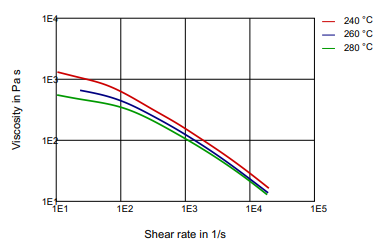
Shearstress-Shear Rate
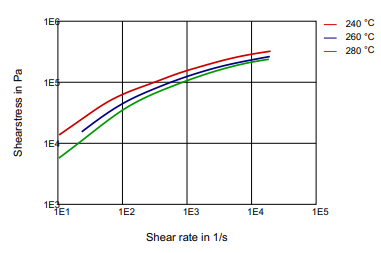
Dynamic Shear Modulus Temperature
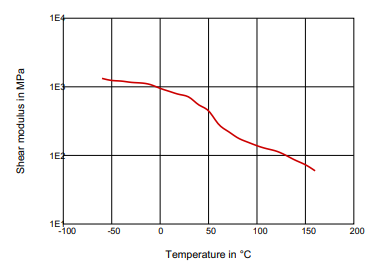
Stress-Strain
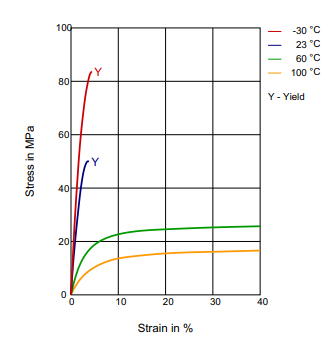
Secant Modulus Strain
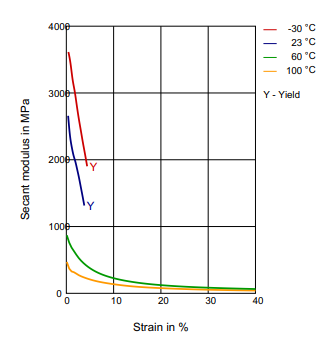
Stress-Strain (isochronous) 73°F
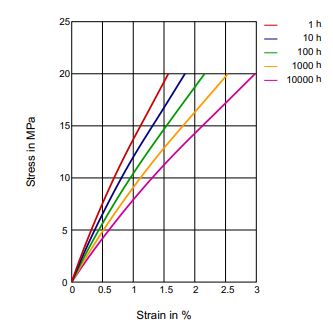
Creep Modulus Time 73°F
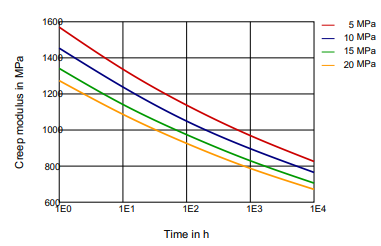
Specific Volume Temperature (PVT)
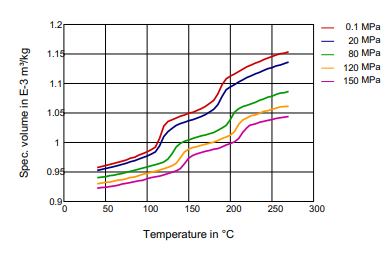
Processing conditions:
- Drying time (only necessary for bags opened for more than two hours): 4-8 hours at 80°C
- Injection temperature (min-recommended-max): 260-270-280°C
- Mould temperature (min-max): 20-60°C
Packaging & Availability
- Packaging Type
Principal Information
- Group Principal Number
- S000003
- Principal
Other
- Color (SDS)
- Translucent
- Insoluble in (SDS)
- Water
- Item Number
- Other Hazards
- Processing may release vapors and/or fumes which cause eye, skin and respiratory tract irritation, Contains high molecular weight polymer(s). Effects due to processing releases or residual monomer: Irritating to eyes, respiratory system and skin, Prolonged or repeated exposure may cause: headache, drowsiness, nausea, weakness, (severity of effects depends on extent of exposure), Handle in accordance with good industrial hygiene and safety practice. (pellets/granules) This material may contain residual caprolactam monomer. This product may release fume and/or vapor of variable composition depending on processing time and temperature.
- Temperature Control
- Yes
- USA/DOT UN Number
- Not Applicable
- Electrical Properties
Value Units Test Method / Conditions Comparative Tracking Index 600.0 - IEC 60112 condensed Dielectric Constant 3.0 - IEC 60250 at 100Hz, condensed Dielectric Constant 3.0 - IEC 60250 at 1 Hz,condensed Dielectric Strength 38.0 kV/mm kV/mm IEC 60243-1 condensed Dielectric Strength 38.0 kV/mm kV/mm IEC 60243-1 dry basis Dissipation Factor 0.062 tan δ tan δ IEC 60250 at 100Hz, condensed Dissipation Factor 0.025 tan δ tan δ IEC 60250 at 1 Hz,condensed - Mechanical Properties
Value Units Test Method / Conditions Charpy Impact Strength 59.0 kJ/m² kJ/m² DIN EN ISO 179-1 Charpy Impact Strength 67.0 kJ/m² kJ/m² DIN EN ISO 179-1 at 23°C, condensed Charpy Impact Strength 61.0 kJ/m² kJ/m² DIN EN ISO 179-1 at 23°C, dry Charpy Impact Strength 59.0 kJ/m² kJ/m² DIN EN ISO 179-1 at -30°C, condensed Charpy Impact Strength 8.0 kJ/m² kJ/m² ISO 179-1EA at 23°C, condensed, notched Charpy Impact Strength 7.0 kJ/m² kJ/m² ISO 179-1EA at 23°C, dry, notched Charpy Impact Strength 5.0 kJ/m² kJ/m² ISO 179-1EA at -30°C, condensed, notched Charpy Impact Strength 5.0 kJ/m² kJ/m² ISO 179-1EA at -30°C, dry, notched Hardness 73.0 HV HV ISO 868 dry, after 15s Hardness 73.0 Shore D Shore D Shore Durometer Scale after 15 seconds Nominal Strain at Break 21.0 % % ISO 527-1 condensed Nominal Strain at Break 14.0 % % ISO 527-1 dry basis Nominal Strain at Break 21.0 % % ISO 527-2 condensed Nominal Strain at Break 14.0 % % ISO 527-2 dry basis Strain at Yield 6.0 % % ISO 527-1 condensed Strain at Yield 4.0 % % ISO 527-1 dry basis Strain at Yield 6.0 % % ISO 527-2 condensed Strain at Yield 4.0 % % ISO 527-2 dry basis Stress at Break 40.0 MPa MPa ISO 527-1 condensed Stress at Break 44.0 MPa MPa ISO 527-1 dry basis Stress at Break 40.0 MPa MPa ISO 527-2 condensed Stress at Break 44.0 MPa MPa ISO 527-2 dry basis Stress at Yield 47.0 MPa MPa ISO 527-1 condensed Stress at Yield 55.0 MPa MPa ISO 527-1 dry basis Stress at Yield 47.0 MPa MPa ISO 527-2 condensed Stress at Yield 55.0 MPa MPa ISO 527-2 dry basis Tensile Creep Modulus 870.0 MPa MPa ISO 899-1 at 1000 hrs, condensed Tensile Creep Modulus 2030.0 MPa MPa ISO 899-1 at 1hr, condensed Tensile Modulus 2030.0 MPa MPa ISO 527-1 condensed Tensile Modulus 2280.0 MPa MPa ISO 527-1 dry basis Tensile Modulus 2030.0 MPa MPa ISO 527-2 condensed Tensile Modulus 2280.0 MPa MPa ISO 527-2 dry basis - Physical Properties
Value Units Test Method / Conditions Density 1030.0 kg/m³ kg/m³ ISO 1183 condensed Density 1030.0 kg/m³ kg/m³ ISO 1183 dry basis Humidity Absorption 2.2 % % ISO 62 at 23°C, RH, 50% dry Load/Unload Temperature 130.0 °C °C ISO 75-1 at 0.45 MPa Load/Unload Temperature 71.0 °C °C ISO 75-1 at 1.80MPa, dry Load/Unload Temperature 130.0 °C °C ISO 75-2 at 0.45 MPa Load/Unload Temperature 71.0 °C °C ISO 75-2 at 1.80MPa, dry Melt Volume-Flow Rate 2.16 % % Dry Melt Volume-Flow Rate 235.0 % % dry, temperature Melt Volume-Flow Rate 8.0 cm³/10 min cm³/10 min ISO 1133 dry basis Melting Point 220.0 °C °C ISO 11357-3 at 10°C/min Melting Point 220.0 °C °C ISO 11357-1 at 10°C/min Mold Shrinkage 0.9 % % ISO 2577 dry, normal Mold Shrinkage 0.7 % % ISO 2577 dry, parallel Mold Shrinkage 0.9 % % ISO 294-4 dry, normal Mold Shrinkage 0.7 % % ISO 294-4 dry, parallel Softening Point 150.0 °C °C ISO 306 at 50°C/h, 50N Storage Temperature max. 140.0 °F °F Thickness 3.2 mm mm Dry Water Absorption 6.6 % % ISO 62 at 23°C, immersion - SDS Physical and Chemical Properties
Value Units Test Method / Conditions Decomposition Temperature (SDS) 662.0 °F °F Density (SDS) 1.05 g/cm³ g/cm³ at 20°C Melting Point (SDS) 220.0-255.0 °C °C - Shelf Life & Stability
Value Units Test Method / Conditions Shelf Life 24.0 mo mo
